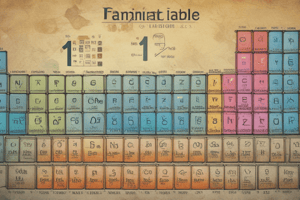Podcast
Questions and Answers
What are transition metals?
What are transition metals?
Elements in Groups 3 through 11.
What is a metal?
What is a metal?
An element that is shiny and conducts heat and electricity well.
What is a metalloid?
What is a metalloid?
An element that has properties of both metals and nonmetals.
What elements are in Group 1?
What elements are in Group 1?
What elements are in Group 2?
What elements are in Group 2?
What elements are in Group 17?
What elements are in Group 17?
What elements are in Group 18?
What elements are in Group 18?
What is a non-metal?
What is a non-metal?
What does malleable mean?
What does malleable mean?
What are the chemical properties of metals?
What are the chemical properties of metals?
What are the chemical properties of nonmetals?
What are the chemical properties of nonmetals?
What does electronegativity refer to?
What does electronegativity refer to?
Above what atomic number are all elements radioactive?
Above what atomic number are all elements radioactive?
What is the most reactive metal?
What is the most reactive metal?
What is the most reactive nonmetal?
What is the most reactive nonmetal?
Which group is nonreactive?
Which group is nonreactive?
Is hydrogen a metal or non-metal?
Is hydrogen a metal or non-metal?
What do all the elements in the same group have in common?
What do all the elements in the same group have in common?
What do all the elements in the same period have in common?
What do all the elements in the same period have in common?
What is electronegativity?
What is electronegativity?
What is ionization energy?
What is ionization energy?
What is atomic radius?
What is atomic radius?
As you go down a group, what happens to the atomic radius?
As you go down a group, what happens to the atomic radius?
As you go from left to right across a period, what happens to the atomic radius?
As you go from left to right across a period, what happens to the atomic radius?
What element is a metalloid?
What element is a metalloid?
What element is a solid metal?
What element is a solid metal?
What element is a liquid metal?
What element is a liquid metal?
What does ductile mean?
What does ductile mean?
Flashcards are hidden until you start studying
Study Notes
Transition Metals
- Transition metals are located in Groups 3 through 11 of the periodic table.
Metals
- Metals are shiny elements known for their excellent conductivity of heat and electricity.
Metalloids
- Metalloids possess characteristics of both metals and nonmetals.
Alkali Metals
- Group 1 elements are referred to as alkali metals.
Alkaline Earth Metals
- Group 2 elements are known as alkaline earth metals.
Halogens
- Group 17 elements are classified as halogens.
Noble Gases
- Group 18 consists of noble gases, which are non-reactive.
Nonmetals
- Nonmetals do not conduct electricity, are dull in appearance, and are brittle.
Malleability
- Malleable materials can be easily shaped or hammered into thin sheets.
Chemical Properties of Metals
- Metals typically form positive charges by losing electrons.
Chemical Properties of Nonmetals
- Nonmetals tend to form negative charges by gaining electrons.
Electronegativity
- Electronegativity measures an atom's attraction for electrons.
Radioactivity
- All elements with an atomic number above 83 are radioactive.
Most Reactive Metal
- Francium (Fr) is recognized as the most reactive metal.
Most Reactive Nonmetal
- Fluorine (F) is the most reactive nonmetal.
Nonreactive Group
- Group 18 elements are considered nonreactive due to their stable electron configuration.
Hydrogen Classification
- Hydrogen is categorized as a non-metal.
Commonality in Group Elements
- Elements in the same group have the same number of valence electrons.
Commonality in Period Elements
- Elements in the same period share the same number of electron shells.
Measure of Attraction for Electrons
- Electronegativity quantifies an atom’s ability to attract electrons.
Ionization Energy
- Ionization energy refers to the energy needed to remove an electron from an atom.
Atomic Radius
- Atomic radius measures the size of an atom from its nucleus to its outermost electron.
Atomic Radius Trends
- Atomic radius increases down a group and decreases across a period from left to right.
Example of a Metalloid
- Antimony (Sb) is identified as a metalloid.
Example of a Solid Metal
- Tin (Sn) is classified as a solid metal.
Example of a Liquid Metal
- Mercury (Hg) is notable for being a liquid metal.
Ductility
- Ductility refers to the ability of a material to be stretched into a wire.
Studying That Suits You
Use AI to generate personalized quizzes and flashcards to suit your learning preferences.




